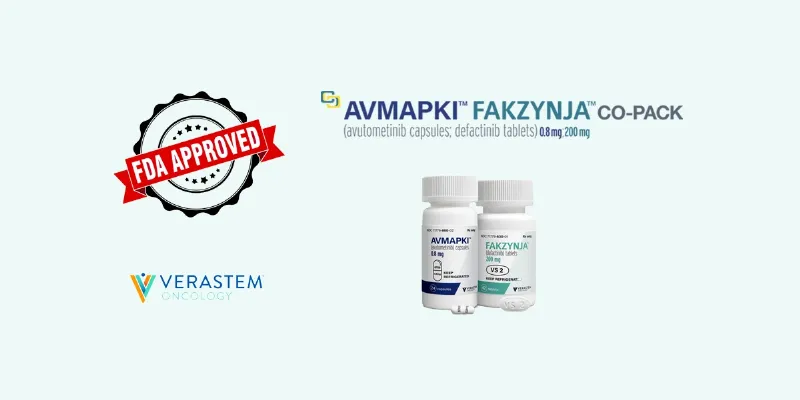Avutometinib Earn Accelerated FDA Approval for Ovarian Cancer

The FDA granted accelerated approval to Avutometinib + Defactinib for KRAS-mutated recurrent low-grade serous ovarian cancer. In the Phase 2 RAMP 201 trial, the oral combination achieved a 44% overall response rate with responses lasting up to 31.1 months. This marks the first FDA-approved therapy specifically for this rare and difficult-to-treat cancer.
Verastem Oncology announced that the U.S. Food and Drug Administration (FDA) has granted accelerated approval to Avutometinib + Defactinib (Avmapki Fakznja Co-Pack) a combination therapy of avutometinib and defactinib, for the treatment of adult patients with KRAS-mutated recurrent low-grade serous ovarian cancer (LGSOC) following prior systemic therapy.
This marks the first-ever FDA-approved therapy specifically targeting this rare and tenacious disease—one that affects approximately 6,000–8,000 women in the U.S. and tens of thousands globally. LGSOC is not only less responsive to standard chemotherapy but disproportionately affects younger women and often follows a relentlessly recurrent clinical course.
“With the first FDA-approved treatment for KRAS-mutated recurrent LSGOC and changing the treatment possibilities for RAS/MAPK-pathway-driven cancers. We now need to build on this milestone to bring this new treatment to patients around the world,” said Professor Susana Banerjee, Consultant Medical Oncologist at The Royal Marsden NHS Foundation.
A Rare Cancer, A First-of-Its-Kind Therapy
The approval stems from results of the Phase 2 RAMP 201 trial, a multicenter, open-label study that evaluated 57 women with measurable, KRAS-mutated recurrent LGSOC. All participants had undergone at least one prior systemic therapy, including platinum-based regimens. KRAS mutations—long regarded as “undruggable”—are found in about 30% of LGSOC cases and are tightly linked to activation of the RAS/MAPK pathway.
The results are striking: the combination therapy achieved a confirmed overall response rate (ORR) of 44% (95% CI: 31–58), with the duration of response (DOR) ranging from 3.3 to 31.1 months. For a patient population that has historically faced limited and often ineffective treatment options, these numbers represent a meaningful clinical advance.
The Science Behind the Synergy
What makes this combination unique lies in its dual targeting of the MAPK signaling pathway—a pathway notorious for driving tumor growth, proliferation, and drug resistance in multiple cancers.
AVMAPKI (avutometinib) is a MEK inhibitor that not only blocks MEK but also prevents its compensatory reactivation via upstream RAF proteins—a common escape mechanism in targeted therapies. However, inhibiting this cascade can activate focal adhesion kinase (FAK), a driver of resistance. That’s where FAKZYNJA (defactinib) comes in, inhibiting FAK and completing the blockade.
The result: a mechanistically rational, synergistic oral therapy designed to counteract tumor growth and therapeutic resistance in RAS/MAPK pathway-driven cancers.
“This first-ever FDA approval in this disease was based on the primary analysis of the Phase 2 RAMP 201 trial, in which the combination of avutometinib and defactinib resulted in a significant overall response rate for patients with a KRAS mutation while being generally well tolerated,” said Dr. Rachel Grisham, Section Head of Ovarian Cancer at Memorial Sloan Kettering Cancer Center and a principal investigator in the trial.
Safety and Tolerability: Not Without Risks
While the RAMP 201 trial found the regimen to be generally well-tolerated, safety signals are worth noting. The most common adverse events (≥25%) included elevations in creatine phosphokinase (CPK), nausea, fatigue, rash, diarrhea, liver enzyme abnormalities, and visual disturbances. Serious risks include ocular toxicities, rhabdomyolysis, hepatotoxicity, and fetal harm if administered during pregnancy.
Patients in the study received avutometinib at 3.2 mg orally twice weekly and defactinib at 200 mg orally twice daily, both given during the first three weeks of each four-week cycle until disease progression or unacceptable toxicity.
A Swift Regulatory Path—and More to Come
The FDA’s accelerated approval, granted well ahead of the anticipated June 30, 2025 PDUFA date, underscores the unmet need in this patient population. The approval benefited from the FDA’s Real-Time Oncology Review (RTOR) program and was supported by Breakthrough Therapy and Orphan Drug Designations.
Yet, the story doesn't end here. Continued approval hinges on the outcomes of RAMP 301, a confirmatory Phase 3 trial that will test the combination further—both in KRAS-mutated and non-mutated LGSOC. The study’s outcome may establish the therapy as a new standard of care in this rare gynecologic malignancy.
The therapy will be made available in the U.S. in the form of the AVMAPKI FAKZYNJA CO-PACK, a co-packaged oral treatment that offers convenient administration for patients and providers alike.
What It Means for Oncology
This approval is emblematic of a broader shift in oncology: targeting rare cancers with biomarker-specific strategies, using rational drug combinations to overcome resistance, and harnessing accelerated regulatory pathways to bring promising therapies to patients faster.











Comments
No Comments Yet!